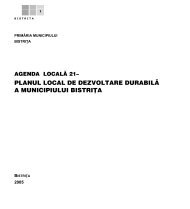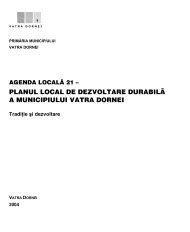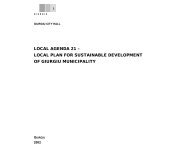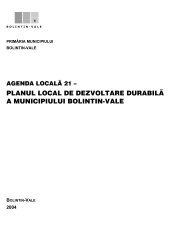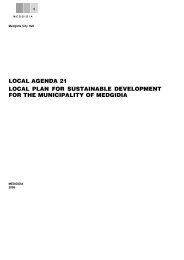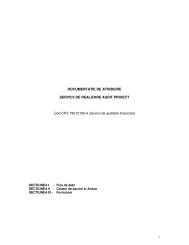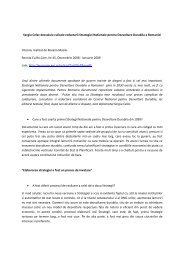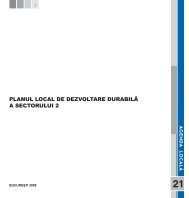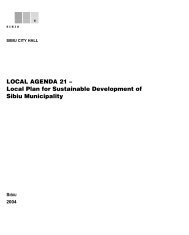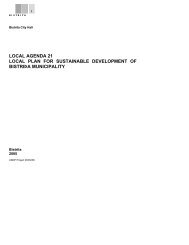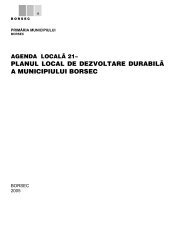English Version - United Nations Development Programme Romania
English Version - United Nations Development Programme Romania
English Version - United Nations Development Programme Romania
Create successful ePaper yourself
Turn your PDF publications into a flip-book with our unique Google optimized e-Paper software.
sectors fall into this category: industries assisting in the modernisation of agriculture and the efficient use<br />
of agricultural, forest, and animal breeding products, communication equipment, computer and software<br />
technology, vehicles, secondary processing of ferrous and non-ferrous metal products, processed<br />
macromolecular products, clothing, furniture, and paper industry, electronic assembly industry,<br />
environmental protection equipment industry, certain categories of machinery and spare parts,<br />
construction materials industry, waste recycling.<br />
The third category includes the remaining sectors and sub-sectors of the extractive and<br />
processing industries.<br />
b) Intra-sectorial restructuring must seek to improve the production structure and its<br />
performances and the modernisation of technologies in viable enterprises, as well as in those enterprises<br />
that have the potential to become viable. This restructuring should take place in all viable or potentially<br />
viable enterprises, no matter the sector they belong to, since, without in-depth market and sector studies<br />
done by professional associations and economic agents, it is currently hard to predict which industries<br />
will be subject to economic growth in the future.<br />
Financial and human resources should focus on the production of a limited number of<br />
products and, in certain cases, of product components, in order to increase, in a shorter time span, the<br />
competitiveness of products, exports, productivity and added value. This can also be achieved by cooperating<br />
with high-standing companies from developed countries.<br />
Closing down or converting oversized enterprises, enterprises with obsolescent or inefficient<br />
technology, without any prospects of becoming competitive.<br />
c) Conforming to European and international standards could act as a catalyst for export<br />
growth and, at the same time, would increase the efficient use of resources, bringing along an increased<br />
added value.<br />
d) Expert products that require advanced processing standards, that would lead to the creation<br />
of specialised structures that will research markets and promote <strong>Romania</strong>’s own interests on third markets.<br />
e) Strengthening of efficient use and growth of the country's own research and development<br />
potential. This implies ensuring co-financing and credits that will support the creation of efficient<br />
technology of national interest.<br />
f) Acceleration of privatisation could stimulate the free enterprise, and this would lead to an<br />
efficient use of industrial capacity. This could also render the economy more flexible to the demand on<br />
the domestic and international markets.<br />
Investment of domestic private capital, in addition to the investment of foreign capital, is a<br />
premise for sustainable economic growth in the national interest.<br />
g) Increasing managerial performance is an essential pre-requisite for the increase of the<br />
industry's competitiveness. The government should support the training of managers in the private and<br />
public sector. Global experience proves that management determines whether privatisation will succeed<br />
or not, keeping in mind that it is the managers and not the shareholders who manage an enterprise.<br />
Investing in management is, in all developing countries or countries that lack experience in market<br />
economy, the most profitable investment sector. Investing in management training will considerably<br />
increase economic competitiveness and growth in the medium and long run.<br />
h) Developing the services required for production, from the initial stages of the production<br />
process (research and development, design, technological engineering, testing, market forecasting) to the<br />
intermediate stages of the process (management, maintenance, quality control) and to the final stages of<br />
the process (distribution, advertising, post-sale services). This is a condition not an option that will make<br />
competition on the market and an increase in exports possible. Therefore, it is necessary to supply more<br />
products and services.<br />
i) Increasing the potential for competition by concentrating the industrial and industrialfinancial<br />
sectors of the economy in holding associations especially in the area of 'strategy and finance'.<br />
The globalisation process stimulates this trend, and there is a gradual but rapid tendency to eliminate tariff<br />
and non-tariff barriers. This leads to the attainment of certain important requirements of sustainable<br />
economic growth by means of:<br />
Drawing up and applying certain coherent strategies on long and medium term, with special<br />
attention being paid to the best employment of limited resources; this can be achieved by certain<br />
advanced processing cycles, which will have a favourable effect on added value and employment.<br />
48



